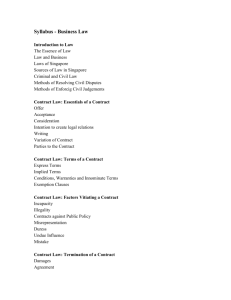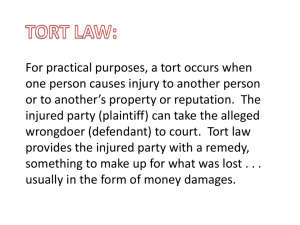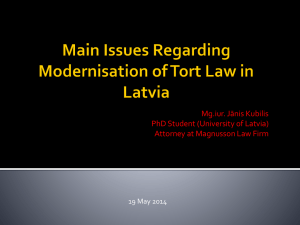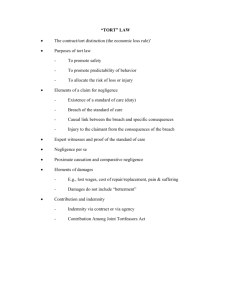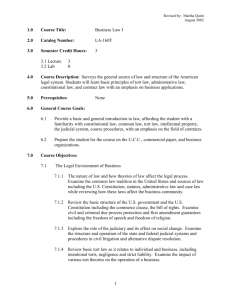Does private law have a future? or 'Oh, the vision thing'
advertisement
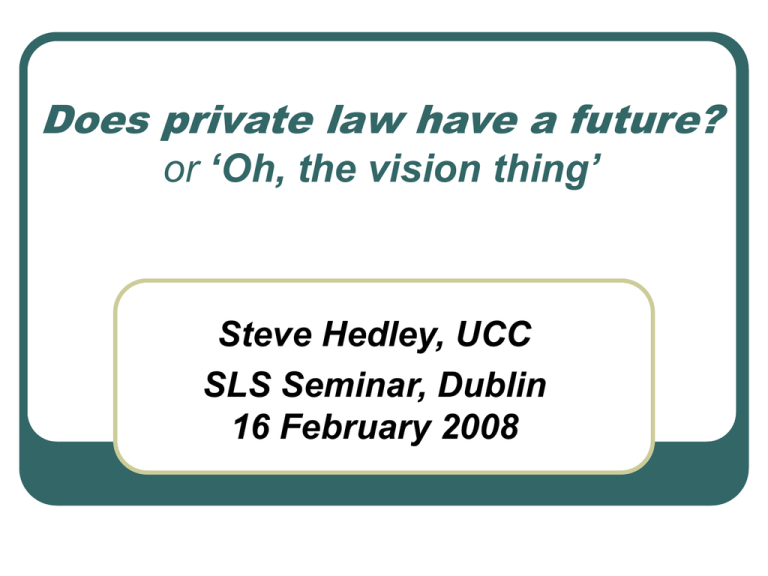
Does private law have a future? or ‘Oh, the vision thing’ Steve Hedley, UCC SLS Seminar, Dublin 16 February 2008 Private law – lost in the labyrinth? Increasing technicality Lack of overall vision – no ‘big ideas’ Overshadowed by public law Hard to explain simply what it is for Contract Law ‘Based on agreement’? • ... but people can ‘agree’ to things they are • • unaware of (!) ... and terms are often drafted centrally and then imposed on individuals ... or even imposed by statute The fully-negotiated contract is discussed as the core case, when everyone knows it is actually rather unusual Tort ‘Based on wrongs’ ? • ... in a rather random way • ... except when it isn’t (strict liability) • ... or except when the wrong attracts vicarious liability The typical tort action is (in reality) against an insurer or a public authority – very distant from the interpersonal dealings the textbooks presuppose Where have we come from? Contract as promise Tort as fault Restitution as unjust enrichment • Acceptance around 1880 • Generally accepted by 1930 • Prominent since the 1990s, though still disputed 1930-1980 Increasing bureaucratisation and state regulation Growth of legal aid and liability insurance Separation of legal thought from public policy Genteel decline of traditional legal approach Slow absorption of contract and tort into regulatory law (or so it seemed at the time) 1980-present Neo-liberalism in government Revival of faith in market processes ... ... but also a belief that markets and property rights are designed, not natural The precise application of contract and tort is continually fine-tuned by statute … while leaving the traditional theory in place for form’s sake So what ‘big picture’ can be drawn today? Possible futures for private law: (1) ‘Muddling through’ (2) ‘Looking inwards’ (3) ‘Looking outwards’ 1. Muddling through Individually interesting issues, but no overall pattern But why would such a field attract interest? Why, indeed, would it matter? A real problem in motivating scholars in this area 2. Looking inwards Re-stating private law in a coherent and structured way Most approaches emphasise interpersonal morality Descriptions of the law are thought to stand or fall on their internal coherence Private law is a matter of justice between individuals, not of public policy Leading proponents Birksian taxonomists Corrective justice Increasing influence of these concepts • Burrows, English Private Law (2nd ed 2008) • Weinrib, The idea of private law (1995) • Lucy, The philosophy of private law (2006); Smith, Contract Theory (2004); Beever, Rediscovering the Law of Negligence (2007) Focus of attention Internationalism (not national systems) Role of individuals (not the state) Legal principle (not policy) Case law (not statute) Morality (not economics or regulatory theory) 3. Looking outwards Asking what private law is for Most approaches emphasise the objectives pursued by the state Accounts of the law stand or fall on how well they serve society Private law is a matter of public policy justice between individuals is simply one of its goals Judging law by external goals Assessing law in the light of public purposes • e.g. viewing private law with economists’ eyes The point is not, however, that private law is vulnerable to external criticism … but rather that ‘external’ criticism is increasingly part of the system, a part of what lawyers themselves argue about Focus of attention Actual workings of national systems Role of the state Legal policy Role of statute and regulations Economics and regulatory theory Looking inwards vs. Looking outwards ‘Search for coherence’ vs. ‘Productive disintegration’ This is, I suggest, should be seen as a balance ... notwithstanding those who want a warto-the-death between these viewpoints Much private law is very bad regulation, as those who look inwards often point out • But which way does that cut? The limits of the ‘inwards’ approach Always looking to the past and ignoring present needs What legislators and judges do will always seem incomprehensible from this angle The (unreasonable) demand that we justify the way our legal systems have (by chance) turned out The limits of the ‘outwards’ approach Not everything in law has a rational purpose Much of the detail is arbitrary – the need is for a system – often, the precise rules don’t matter Sometimes the ‘inwards’ approach actually serves public policy • See e.g. arguments over ‘neoformalism’ in contract A way forward? Ultimately, what private law needs is a new conception of the state Role of the state in defining private rights (not insignificant but not absolute either) Need to find connections between private rights and how public law sees them
